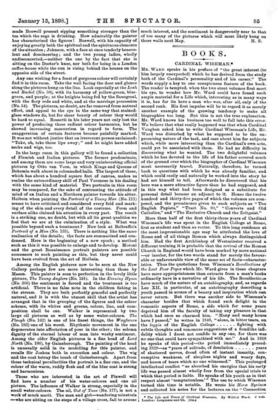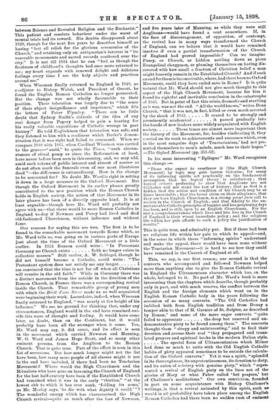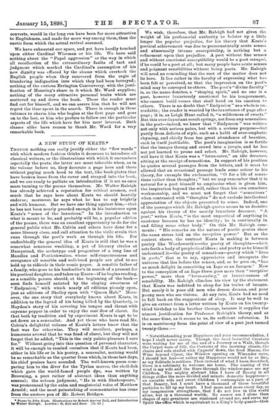BOOKS.
CARDINAL WISEMAN,
Mn. WARD speaks in his preface of "the great interest (to him largely unexpected) which he has derived from the study both of the Cardinal's personality and of his career?' The words supply a key to one conspicuous feature of the book. The reader is tempted, when the two stout volumes first meet his eye, to wonder how Mr. Ward could have found such ample material for a Life which, interesting as in many ways it is, has for its hero a man who was, after all, only of the second rank. His first impulse will be to regard it as merely another example of the growing tendency to make all biographies too long. But this is not the true explanation. Mr. Ward knows his business too well to fall into this error. We believe that what really happened was that when Cardinal Vaughan asked him to write Cardinal Wiseman's Life, Mr. Ward was disturbed by what he supposed to be the un- promising nature of the task, and cast about him for subjects which, while more interesting than the Cardinal's own acts, could yet be associated with them. He had no difficulty in discovering what he wanted. The two delightful volumes which he has devoted to the life of his father covered much of the ground over which the biographer of Cardinal Wiseman must necessarily travel. Naturally, therefore, he turned back to questions with which he was already familiar, and which could easily and naturally be worked into the story he had set himself to tell. Afterwards he discovered that his hero was a more attractive figure than he had supposed, and in this way what had been designed as a substitute for personal detail became an adjunct to it. Hence the twelve hundred and thirty-five pages of which the volumes are com- posed, and the prominence given to such subjects as "The English Papists," "Tract No. 90," "Converts and Old Catholics," and "The Exclusive Church and the Zeitgeist."
More than half of the first thirty-three years of Cardinal Wiseman's life was spent in the English College at Rome, first as student and then as rector. To this long residence at the most impressionable age may be attributed the love of Rome and of all things Roman which always distinguished him. Had the first Archbishop of Westminster received a different training it is probable that the revival of the Roman Church in England would have been marked by more national —or insular, for the two words stand for merely the favour- able or unfavourable view of the same set of facts—character- istics. Thus the quotations from Wiseman's Recollections of the Last Four Popes which Mr. Ward gives in these chapters have more appropriateness than extracts from a man's books ordinarily have in a narrative of his life. The Recollectioas have much of the nature of an autobiography, and, as regards Leo XII. in particular, of an autobiography describing a youth passed in scenes of a beauty and inspiration which can never return. But there was another side to Wiseman's character besides that which found such delight in the romantic aspects of Rome, a side which for some years deprived him of the faculty of taking any pleasure in that which had once so charmed him. "Many and many hours have I passed," he writes in 1848, "alone, in bitter tears, on the loggia of the English College fighting with subtle thoughts and venomous suggestions of a fiendlike infi- delity which I durst not confide to any one, for there was no one that could have sympathised with me." And in 1858 he speaks of this period—the period immediately preced- ing 1829—as "years of solitude, of desolation years of shattered nerves, dread often of instant insanity, con- sumptive weakness, of sleepless nights and weary days, and hours of tears which no one witnessed." This prolonged intellectual conflict "so absorbed his energies that his early life was passed almost wholly free from the special trials to which that period is liable. He speaks of his youth as in that respect almost ' temptationless." The use to which Wiseman turned this time is notable. He wrote his Horx Syriacat and collected his notes for the lectures on the "Connection • The Life and Times of Cardinal Wiseman. By Willnd S vols. London: Longman& and Co. 124s./
between Science and Revealed Religion and the Eucharist." This patient and resolute behaviour under the worst of mental trials had its reward. His doubts disappeared about 1829, though for the next five years he describes himself as having "lost all relish for the glorious ceremonies of the Church," and retaining only an antiquarian's interest in "its venerable monuments and sacred records scattered over the city." It is not till 1834 that he can "feel as though the freshness of childhood's thoughts had once more returned to me ; my heart expands with renewed delight and delicious feelings every time I see the holy objects and practices around me."
When Wiseman finally returned to England in 1840, as cladjutor to Bishop Walsh, and President of Oscott, he found the English Roman Catholics no longer persecuted. But the change was not wholly favourable to their position. Their toleration was largely due to "the sense of their abject insignificance and impotence," which fills the letters of Peter Plymley. "There can be little doubt that Sydney Smith's ridicule of the idea of any real danger from Popery helped to gain a hearing for his really valuable expositions of Catholic wrongs in past history." He told Englishmen that toleration was safe, and they listened to him with a readiness which Barke's demon- stration that it was right had failed to command. When we compare 1810 with 1865, when Cardinal Wiseman was carried to the grave—" amid," to quote the Times, "such circum- stances of ritual pomp as since the Reformation at least, have never before been seen in this country, and, we may add, amid such tokens of public interest and almost of sorrow as do not often mark the funerals even of our most illustrious dead "—the difference is extraordinary. How is the change to be accounted for? No doubt Mr. Ward is right in setting it down in a large measure to the Oxford Movement. But though the Oxford Movement in its earlier phases greatly contributed to the new position which the Roman Church holds in English society, the action of that Movement in its later phases has been of a directly opposite kind. It is at least arguable—though here Mr. Ward will probably not agree with us—that there would be more Roman Catholics in England to-day if Newman and Pusey had lived and died old-fashioned Churchmen, without influence and without fame.
Our reasons for saying this are two. The first is to be found in the remarkable movement towards Rome which, as Mr. Ward tells us, was going on in various parts of Europe just about the time of the Oxford Movement or a little earlier. In 1824 Bunsen could write: "In Protestant Germany no Church exists faith no longer exists in collective masses." Still earlier, A W. Schlegel, though he did not himself become a Catholic, could write : "The Protestant system does not satisfy me any longer am convinced that the time is not far off when all Christians will reunite in the old faith." While in Germany there was a distinct movement from the outside in the direction of the Roman Church, in France there was a corresponding revival inside the Church. That remarkable group of young men
with which the Recit d'une Sceltr made us so well acquainted were beginning their work. Lacordaire, indeed, when Wiseman
finally returned to England, "was nearly at the height of his influence." We see no ground for thinking that, under any circumstances, England would in the end have remained out- side this wave of thought and feeling. It would have come later, no doubt, than on the Continent, but it would probably have been all the stronger when it came. Yes, Mr. Ward may say, it did come, and its effect is seen
in the movement which carried Newman and Manning, W. G. Ward and James Hope Scott, and so many other
eminent persons, from the Anglican to the Roman Church. That is quite true. Part of the effect is seen in this list of secessions. But how much longer might not the list have been, how many more people of all classes might it not in the end have included, if there had been no Tractarian Movement Where would the High Churchmen and the Ritualists who have gone on leavening the Church of England for the last half-century have been if the Established Church had remained what it was in the early "thirties," "at the lowest ebb to which it has ever sunk, 'folding its arms,' as Mr. Mozley says, to die with what dignity it could ' " ? The wonderful energy which has characterised the High Church revival—quite as much after the loss of Newman, and five years later of Manning, as while they were still Anglicans—would have found a vent somewhere. If, in the face of discouragement, of opposition, of contempt, the revival has in many ways transformed the Church
of England, can we believe that it would have remained inactive if even a partial transformation of the Church
of England had proved impossible P Can we imagine Pusey, or Church, or Liddon settling down as pious Evangelical clergymen, or pluming themselves on having dis- covered with how small a fraction of Christian belief a man might honestly remain in the Established Church? And if such an end for them is inconceivable, where, had there been no Oxford Movement, could they have ended save in Rome P It is quite natural that Mr. Ward should not give much thought to this aspect of the High Church Movement, because for him it found its rightful and inevitable conclusion in the catastrophe of 1845. But in point of fact this crisis, dramatic and startling as it was, was not the end. "All the world knows," writes Dean Church, "that it was not, in fact, killed or even much arrested by the shock of 1845 It ceased to be strongly and prominently academical it passed gradually into the hands of new leaders more widely acquainted with English society These times are almost more important than the history of the Movement, for, besides vindicating it, they carried on its work to achievements and successes which, even
in the most sanguine days of Tractarianism,' had not pre- sented themselves to men's minds, mach less to their hopes." —The Oxford Movement (pp. 351-52).
In his most interesting " Epilogue " Mr. Ward recognises this change :—
"Those who expect to overthrow it [the High Church Movement] by logic may gain barren victories ; for many of its informing spirits act practically on the fundamental assumption that no logical theory is satisfactory ; that logical criteria professing to show that Anglicans are not Catholics will not stand the test of history; that as God is a hidden God the action and condition of his Church may be at times inscrutable ; that the broad claim on their allegiance, that they are born English Churchmen, is a strong printi-facie call to remain in the Church of English ; and that fidelity to the un- mistake able Catholic principles of happier and less perplexing days has been, and is still, open to an English Churchman. For the rest a comprehensiveness which lives and lets live in the Church of England is their wisest immediate policy ; and the religious life within her pale affords to such a policy the justification of results."
This is quite true, and admirably put. But if there had been no religious life within her pale to which to appeal—and, in the sense in which these "informing spirits" understand and make the appeal, there would have been none without the Tractarian Movement—it is hard to see how they could have remained in the Church of England at all.
This, we say, is our first reason; our second is that the converts who accompanied and followed Newman helped more than anything else to give the Roman Catholic revival in England the Ultramontane character which has, on the whole, belonged to it. No part of Mr. Ward's book is more interesting than the chapters which describe, though probably only in part, and with much reserve, the conflict between the English and the foreign elements which went on in the English Roman Catholic body in the years following the accession of so many converts. "The Old Catholics had imbibed both from English tradition and from Douay a temper akin to that of M. Gamier of St. Sulpice, as described
by Renan," and some of the more eager converts "quite failed to appreciate the deep but reserved and un- demonstrative piety to be found among them." The converts thought them "sleepy and uninteresting," and to feed their devotion and arouse their zeal "they propagated and trans- lated prayers and spiritual books in the modern Italian style.
The special form of Ultramontanism which Milner had done so much to unite with the Old English Catholic habits of piety appeared sometimes to be outside the calcula- tion of the Oxford converts." Yet it was a spirit, "splendid in its thoroughness, its unpretentiousness, its devotion to duty, and its union of sobriety with genuine piety," which "repre- sented a revival of English piety on the lines not of the glories of Mary or what Faber called 'hot prayers,' but of Challoner's meditations." Our own conviction, founded in part on some acquaintance with Bishop Challoner's
writings, is that a revival animated by this spirit, such as) would in all probability have taken place among the English Roman Catholics had there been no sudden rush of eminent
converts, would in the long run have been far more attractive to Englishmen, and made far more way among them, than the exotic form which the actual revival assumed.
We have exhausted our space, and yet have hardly touched upon either Cardinal Wiseman or his life. We have said nothing about the "Papal aggression" or the way in which all recollection of the extraordinary faults of tact and judgment which marked the Cardinal's assumption of his new dignity was effaced by the shame which overtook the English people when they recovered from the orgie of blundering indignation into which they had been betrayed ; nothing of the curious Errington Controversy, with the justi- fication of Manning's share in it which Mr. Ward supplies; nothing of the many attractive personal traits which are scattered up and down the book. These the reader must find out for himself, and we can assure him that he will not regret the time spent in the search. There is enough in these volumes to charm him who begins at the first page and goes on to the last, or him who prefers to follow out the particular aspects of the life which have for him most interest. Both classes alike have reason to thank Mr. Ward for a very remarkable book.




































 Previous page
Previous page